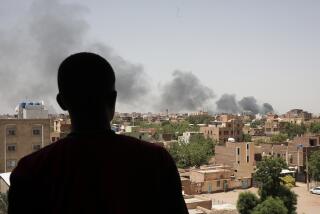EC and U.S. Act to Protest Serbs’ Bosnia Attacks
- Share via
VIENNA — Overwhelmed by ethnic bloodshed that has raged out of control, the European Community pulled the last of its monitors out of Bosnia-Herzegovina on Tuesday, relief workers indicated that they may soon give up as well and the United States recalled its ambassador from Belgrade.
The measures were aimed both at punishing the Serb-controlled remains of Yugoslavia for ravaging Bosnia and at pressuring the aggressors to abide by international convention.
But it was unclear whether the moves would ease the fighting in Bosnia. Some fear that the reduced Western presence may instead remove the last deterrent to all-out slaughter in the newly independent republic.
“We are risking too much,” the European Community’s mission chief, Antonio Santos, told reporters in Sarajevo, the Bosnian capital, before a four-vehicle convoy left for the Adriatic port of Split, in neighboring Croatia. “There is wrong behavior toward us, and some people are out of control.”
The EC withdrew 25 observers from Bosnia last week after accusing Yugoslav federal army forces of deliberately shooting to death a Belgian monitor near the shattered city of Mostar. At the insistence of German Foreign Minister Hans-Dietrich Genscher, the 12-nation EC called home its ambassadors from Belgrade, the Yugoslav capital, on Monday.
A two-month offensive by Serbian guerrillas and federal army troops opposed to Bosnian independence has killed 1,300 people--many of them civilians--and driven nearly 20% of the ravaged republic’s citizens from their homes.
“I thought I had seen everything, but what is happening in Bosnia passes all imagination,” said Jose-Maria Mendiluce, a veteran field officer for the United Nations’ refugee agency.
“I have seen irregulars drive into villages, not to fight armed opponents but just to terrorize the population with violence and threats into leaving because they are of another ethnic group,” Mendiluce told a press conference in Geneva.
Mendiluce described Bosnia as a “state of horror” and said the suffering of the civilian population was the worst he had seen in 14 years of relief work in Third World conflicts.
In Washington, the Bush Administration announced the recall of Ambassador Warren Zimmermann from Belgrade to demonstrate continuing U.S. condemnation of Serbian-backed aggression in Bosnia.
State Department spokeswoman Margaret Tutwiler said the action was “in coordination” with Monday’s withdrawal of EC ambassadors. She conceded that the action may be considered ineffective but said that Washington has little leverage to do more.
“All of us have done whatever--and in some instances you all may judge it as limited--to do whatever we can to try to influence a cessation of this constant hardship and tragedy,” Tutwiler said.
She said there was not much else the United States could do short of taking military action, a step that she and other Administration officials have said has been ruled out.
Bosnia has been consumed in ethnic fighting since a Feb. 29 referendum in which two-thirds of the republic’s eligible voters endorsed independence, following Slovenia, Croatia and Macedonia in seceding from Serb-dominated Yugoslavia.
Most Muslims and Croats, who together comprise about 60% of the population, voted in favor of independence.
But ethnic Serbs account for about 31% of Bosnia’s population. With the backing of more than 100,000 predominantly Serbian federal troops and tens of thousands of Serbian guerrillas under the command of Belgrade-based militias, they have staged a bloody rebellion and driven the republic to the brink of collapse.
Serbia and its tiny ally Montenegro banded together in a new two-republic federation late last month, but the new nation--still called Yugoslavia--has yet to win recognition from any major country.
Ostracized Yugoslavia has so far been allowed to assume the diplomatic status and international memberships of the former federation of six republics. But the 52-nation Conference on Security and Cooperation in Europe inflicted the first toll on that inheritance Tuesday when it voted to exclude Yugoslav delegates from any decisions concerning Bosnia until the end of June.
The moves to isolate Serbia can be expected to intensify an atmosphere of paranoia in the republic, where civilians have been presented a grossly distorted picture of the Bosnian conflict by state-run Belgrade television and newspapers loyal to Serbia’s Communist strongman, Slobodan Milosevic.
But the actions will likely do little to deter aggressors who have repeatedly defied international warnings and ignored sanctions imposed at earlier stages of the brutal Yugoslav conflict, which took 10,000 lives last year in Croatia.
Armed gangs controlling all roadways have hijacked food and medical aid intended for Bosnia’s 700,000 refugees. Some have even stolen aid vehicles and held volunteer relief workers captive.
In addition to the foreign aid volunteers, who have not said when or if they will leave, the U.N. peacekeeping force deployed to Croatia remains headquartered in Sarajevo.
U.N. mission spokesman Fred Eckhart acknowledged last week that violence in Bosnia has hampered the peacekeeping operation and disappointed those who thought it would serve to deter the spread of ethnic fighting to their republic.
“They’ve accepted that we can’t end the war and that we’re not capable of a major humanitarian relief effort,” Eckhart said of the people of Sarajevo. “But if we pull out, the situation could get a lot worse.”
Times staff writer Norman Kempster in Washington contributed to this article.
More to Read
Sign up for Essential California
The most important California stories and recommendations in your inbox every morning.
You may occasionally receive promotional content from the Los Angeles Times.














